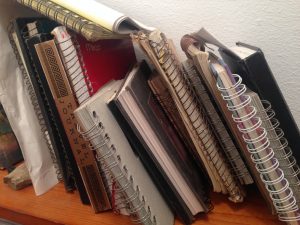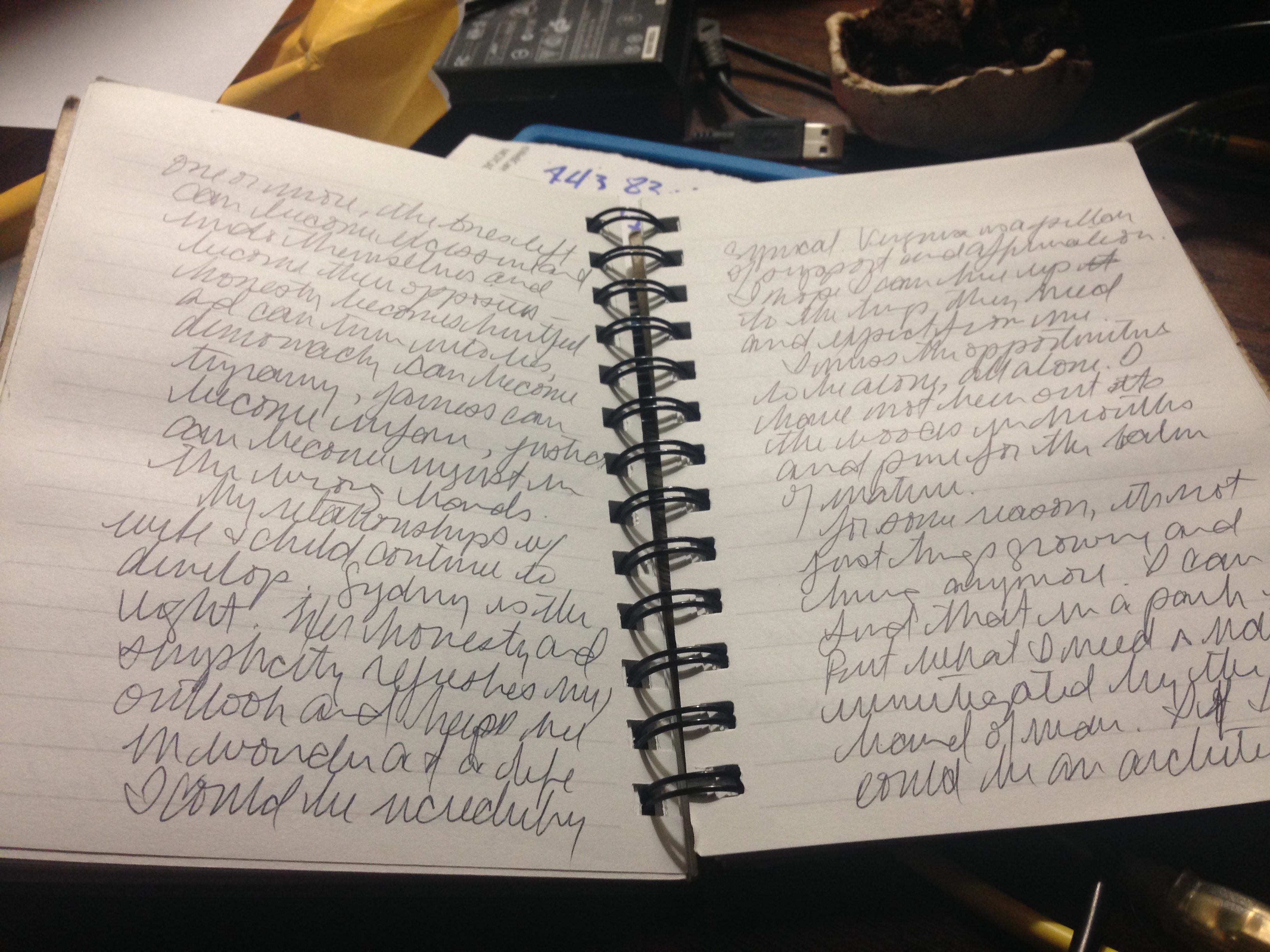A stack of journals lines the top shelf of a book stand in the closet. They get a quick look every now and then. Once, I think I arranged them in chronological order, but that was so long ago, I can no longer be sure I did it. I can’t be sure of anything, even what I wrote in those books.
I have kept a journal on and off for thirty-some years. A journal seemed the right thing for my first trip to Germany in 1985. I didn’t have a real journal book, just some spiral note pads. Today, the metal is rusted and the notebooks flabby. Out of their pages came those first letters home, written and posted from somewhere along the road.
After I reached my destination, a little room in the winemaker apprentice school, I traded a hat and five marks for an Erika East German portable typewriter. It was way overbuilt and sturdy and light. I abandoned the journals and wrote long letters, stories, and bad poems on that typewriter. Years ago, my mom sent me the letters I had written to her and dad. But I wonder where all those hundreds of pages of letters I sent to friends and acquaintances went. Trashcan, probably. Who thinks to save these things?
The journals pick back up after my second return trip from Germany. They go on for a while, then fall off. My journal keeping has been, at best spotty until the last fifteen years or so, and even then it was on on-and-off proposition. I took to black, hardcover sketchbooks of various sizes back then, and this would give a look of uniformity to the stack of journals if I’d put them in the stack.
 Even then, you’d think that I would have at least thirty journals, one a year. That’s reasonable, I think. But I don’t. I think, at best, I have twenty. In recent years, I haven’t put newly finished journals in the closet. Instead, I’ve scattered them hither and thither among the stacks of books on a bench next to my bed. Someday, I will go through them and see if I can put them in order. For now, they sit there gathering dust.
Even then, you’d think that I would have at least thirty journals, one a year. That’s reasonable, I think. But I don’t. I think, at best, I have twenty. In recent years, I haven’t put newly finished journals in the closet. Instead, I’ve scattered them hither and thither among the stacks of books on a bench next to my bed. Someday, I will go through them and see if I can put them in order. For now, they sit there gathering dust.
I wonder what those journals will say of me. A time or two through the years, I have paged through the notebooks and sketchbooks, just to see. They bring back memories and feelings, places where I was and what I was thinking. Sometimes the entries comprise no more than diary: “I did this on this day, and that, and the next morning I did this . . . ” Other entries delve into the personal crises/joys/accomplishments I was dealing with at the time.
I think, maybe someday, I will sit down and read through the record I have left for myself. As soon as I do, I put it out of my mind. What am I going to find there that I don’t already know? Plenty. My short glances into them showed me what a screwed up guy I was. Confused, self-satisfied, anxious to the point of breakdown, confident, unsure. You name it. What I revealed in those journals was that I changed from day to day. When I was uncontrolled bipolar, I put down the wild thoughts of grandeur and suicide in those books. Just a cursory look told me those things. That’s why I don’t want to look deeper.
As I write in my journals, I have a feeling someone’s looking over my shoulder. After all, if I didn’t want these things out in the public at some time, I would have thrown those journals away. I’m a historian, trained in research method and archival practice. I have looked through other people’s journals and read events of their days in them.
So, for instance, here’s a journal from 1999. “The story is personal, but only in the sense that it must be built on principles of honesty, fairness, and democracy.” Laudable stuff. It turns out I used this journal as a notebook for some of the stories I was writing for the newspaper I once worked for. “I doubt myself so much,” I go on in the next paragraph, “but when I read my stuff (newspaper articles), it is almost as if someone else wrote the stories. In other words, the inner and outer manifestations of me are completely different—and, whatever the case, honesty and democracy prevail in both.”
There’s an extended contemplation of the commutation of Darrell Mease’s execution by the state of Missouri. Mease was to be put to death near the time of John Paul II’s visit to St. Louis. The governor, Mel Carnahan, commuted the sentence. I saw in the act hypocrisy. What about all those other inmates who would die because the pope didn’t visit. Not that I think it unfair—I am absolutely opposed to the death penalty. But at bottom, I wrote, “they have told a man they would kill him. Then, they said they would wait and then that they wouldn’t—only to save their reputations and insure that their actions in carrying out punishment would escape the scrutiny of the rest of the world.”
Later in the journal, I’m thinking of my past. I have a list of story ideas:
- Indians:
- Navajo selling jewelry
- Scenic view
- Gordon Longtree
- Poplar, MT
- Wolf Point, MT
- Asians:
- Francis Xavier Yamaguchi
- Quan Trang
- Washington, DC
- Germans:
- Grand Canyon
- Avelsbach
- Ivo
- Several stories about Trier
- Bakery
- Glenda/Simplicissimus
- in Saarstrasse
The thing is I know what all these stand for. Over the years, I have written many of these stories. Some, like “Indians” stories wound up in my book, Seldom Seen: A Journey into the Great Plains. The “Germans” stories and Francis Xavier Yamaguchi all wound up in a book that I still have to find a home for, It’ll All Be New.
There are exceptions to my knowledge about these topics. The entry “Washington, DC,” I’m sure, it has to do with a research trip I made to the city in the summer 1992 when I was working on my master’s thesis. The particulars are lost to me. The other exception is “Glenda/Simplicissimus.” I didn’t tell that story in It’ll All Be New—one of a crush that I had on a German woman who hung around a café named after a famed German satirical magazine. But, I’ll leave that for the future.
What will someone in the future take from this? As I said, I have researched the journals of common people, just Joes, who never rose to a point of prominence even in their own communities. Their journals say a lot about them and the world of their times. Will my journals do the same someday? Or will they wind up in a box of other trash my kids clean out of the closet after Virginia and I are dead?
It’s an interesting question. But in contemplating it, I see that I used these books and my pen to work out problems, get perspective on my sometimes-tiny view of the universe, and to give myself comfort in times of trouble.
And maybe that’s all a journal should be.

Comments